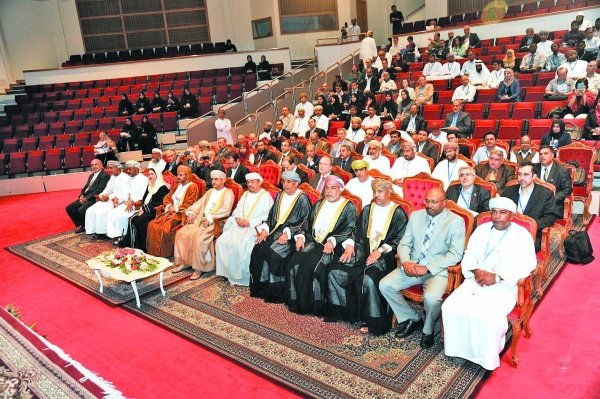
Muscat: The International Water Conference 2016, “Water Resource in Arid Areas: the Way Forward,” organised by the Water Research Centre at the Sultan Qaboos University, commenced today under the patronage of Ahmed Abdullah Al Shehi, Minister of Regional Municipalities and Water Resources.
**media[355979]**
The four-day conference will discuss water resources in arid areas and their problems, ways to tackle water pollution, water governance, economic and social aspects of water, drought policies, innovation and technology to cope with water scarcity and drought, water resource management for control of drought, integrated management of water resources in arid areas and semi-arid and conservation of water resources.
The event is held in association with The Research Council (TRC), the Ministry of Regional Municipalities and Water Resources, Haya Water and the United Nations Economic and Social Commission for Western Asia (UN-ESCWA).
Speaking on the occasion, Dr. Osman Abdalla, Director of SQU’s Water Research Centre, said the rising demand for water associated with population growth, water intensive diets and rising living standards, is stressing water resources.
“The situation is much aggravated in arid regions where natural resources are facing depletion which is attributed to low precipitation and high evaporation rates. The water budget deficit in arid regions, the high cost of water supply, the essential need for food and associated energy value among other challenges, all need to be scientifically addressed to find solutions to world’s current and future water problems,” he said.
Dr. Abdalla hoped that the present conference, which has brought together scientists, engineers and policy makers, would share the latest knowledge in water research and explore the ways in findings solutions to water crises with emphasis on arid areas.
Delivering his keynote address on “Water Challenges and Unintended Consequences of Development in Arid Regions,” Dr. Kaveh Madani, Senior Lecturer in Environmental Management at the Imperial College, London stressed on a holistic understanding of water resources systems, as a vital prerequisite for strategic decision making in water management.
“Empowerment of farmers is important; at the same time, phrases such as “food security” and “food self-sufficiency” can be dangerous and misleading when it comes to sustainable water management. Decision makers should understand the social and political dimensions before implementing long-term strategies in water management. Considering the fact that 70 per cent of water is used for agriculture, modernization of agriculture and revision in crop patterns can help improve sustainable water use globally. Promoting and developing regional farming cooperatives and water management institutions, and increasing water and energy prices together with technological improvements to prevent socioeconomic pressure on rural and farmer communities, would also help to meet water challenges in the world,” he said.
The conference includes nine scientific sessions, entitled Water Management and Hydrological Systems, Flash Flood and Erosion in high-risk Areas, Water Investment in Rural Areas, Irrigation Management, Technology and Cost, Rain Water Management, Irrigation Management, Climate and Hydrology, Water Quality and Agriculture and Water Conservation and Agriculture.
The scientific committee of the conference received more than 300 abstracts on water research from water scientists across the world. In addition, the committee received over 200 full papers to be considered for publication in the special issue, “Water Resources in Arid Areas: the Way Forward,” in the Arabian Journal of Geosciences and to be published in a Springer Book on conference proceedings as well.